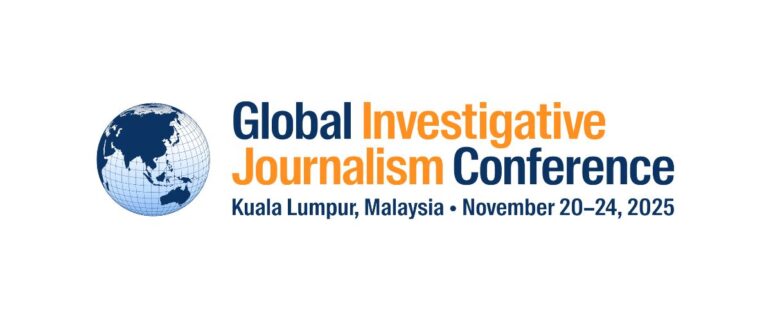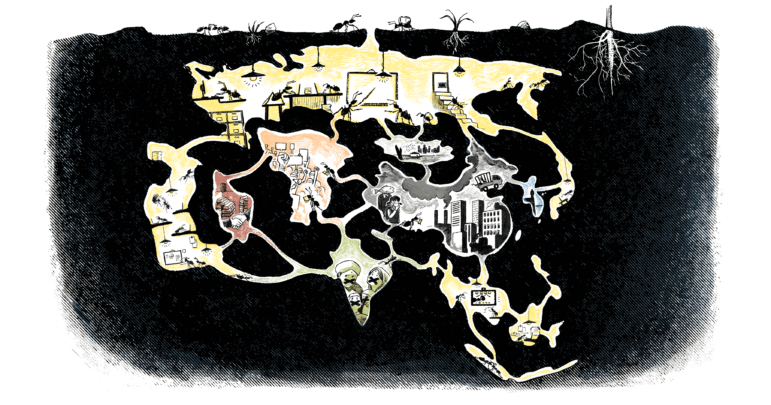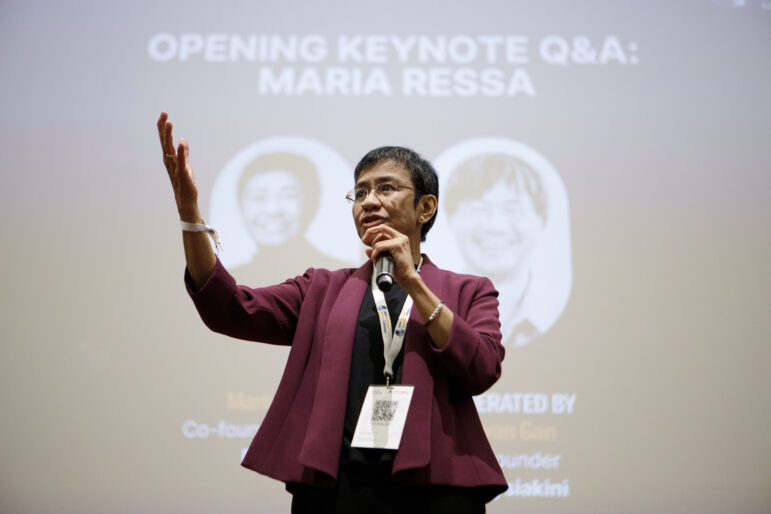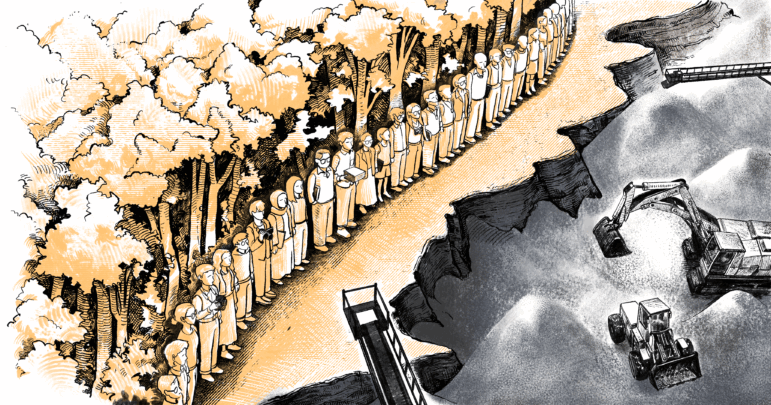

The GICJ25 keynote panel on Uncovering Asia. Image: Samsul Said, Alt Studio for GIJN
When Tempo reporter Francisca Cristy Rosana opened the cardboard box addressed to her, she found a pig’s head with its ears cut off.
The box was delivered to the Tempo Digital newsroom in March after the Indonesian publication, which started as a weekly news magazine in 1971, had published a story about an online gambling operation that implicated a powerful politician and another organizer with ties to the police.
“I think it’s one of the most graphic terror acts that we have received throughout our existence,” said Wahyu Dhyatmika, CEO of Tempo Digital.
Nearly three weeks after the online gambling story was published, the Tempo Digital website was hit with a DDoS (distributed denial-of-service) attack. Dhyatmika said that these attacks indicated that the media is being backed into the corner of an already shrinking civic space for dissent. During large street demonstrations, the police target photographers and videographers.
“They will try to erase and delete all recordings of police beating the protesters,” he said at a keynote panel that opened the 14th Global Investigative Journalism Conference 2025 (GIJC25) in Kuala Lumpur, Malaysia.
Veteran investigative editors from across Asia, whose work has toppled dictators and exposed massive corruption in government, headlined the panel, sharing strategies for reporting in a region that is defined by growing hostility toward the press. They spoke against a backdrop of rising authoritarianism, tech oligarchs tightening control of information, shrinking media budgets, and escalating digital and physical threats, many of which are targeted at female journalists.
The session followed a forceful keynote address by 2021 Nobel Peace laureate Maria Ressa, who warned that in the face of authoritarianism sweeping across the globe, many press freedoms may only have a year or two before they could be lost forever.
This panel featured Glenda Gloria, executive editor of Rappler (Philippines), Gunel Safarova, acting director and editor-in-chief of Abzas Media (Azerbaijan), Mayank Aggarwal, trustee and editor at The Reporters’ Collective Trust (India), Sherry Lee, COO and deputy CEO of The Reporter (Taiwan), Wahyu Dhyatmika, CEO of Tempo Digital (Indonesia), and Yongjin Kim, co-founder of Newstapa (South Korea). The session was moderated by Steven Gan, co-founder of GICJ25 co-host Malaysiakini.
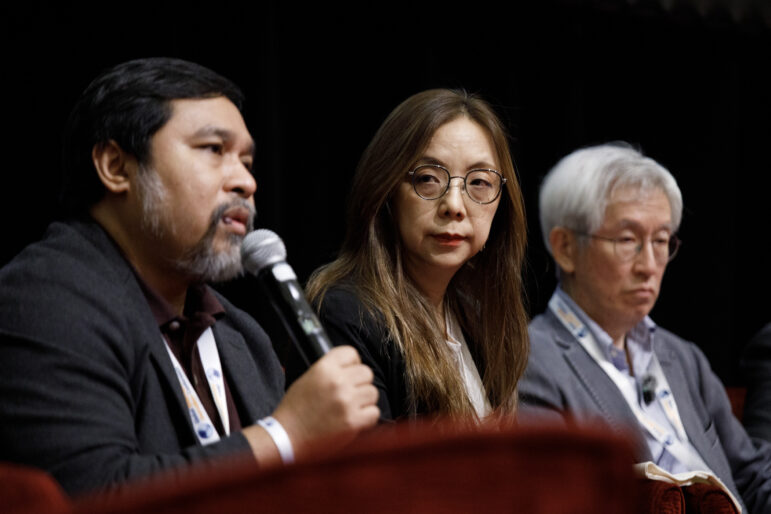
Wahyu Dhyatmika, CEO of Tempo Digital, Sherry Lee, COO and deputy CEO of The Reporter, and Yongjin Kim, co-founder of Newstapa (left to right). Image: Samsul Said, Alt Studio for GIJN
Another Record-Setting Year for Jailing Journalists
According to a Committee to Protect Journalists (CPJ) report released in January 2025, by December 1, 2024, at least 361 journalists were imprisoned worldwide.
The nations leading the crackdown were China, with 50 journalists behind bars, followed by Israel with 43 journalists (all Palestinian) in detention, and Myanmar, holding 35 under its military regime. Other top offenders included Vietnam and Russia. CPJ attributed the detentions to a mix of authoritarian repression, wartime crackdowns, and political instability in the region.
Detention is a grim reality for Azerbaijani investigative journalist Gunel Safarova, acting director and editor-in-chief of the exiled outlet Abzas Media. Safarova detailed how her team has pushed back even after a brutal government crackdown that targeted independent media. In November 2023, six of Safarova’s colleagues were arrested and sentenced to between seven-and-a-half and nine years on charges described by human rights and media freedom groups as politically motivated.
Abzas set up a new newsroom in exile while the imprisoned reporters continue to write from behind bars, exposing corruption within the prison system. Safarova revealed that three of her female colleagues were transferred from Baku, Azerbaijan’s capital, to another smaller region farther away from their families.
When Abzas started working in exile, many people showed their support to keep them reporting. Exile was not the hardest part, but staying committed to journalism while colleagues are unjustly detained is both painful and motivating.
“Emotionally, it is hard because when your colleagues, who are your friends, are kept in prison, it is unjust. But I think we owe them a debt,” said Safarova.
Warfare Over Narratives
Sherry Lee, COO and deputy CEO of The Reporter, highlighted a major cross-border investigation into China’s growing military pressure on Taiwan.
“Taiwan is sometimes referred to as the most dangerous place on Earth because China has conducted military exercises around Taiwan for years,” said Lee. However, since 2022, when then-US House Speaker Rep. Nancy Pelosi visited Taiwan, the drills have become more frequent and larger in scope.
“What we are facing now is not an open war. This is a gray zone of conflict,” said Lee of the nearly daily incursions, intimidation, and disinformation designed to destabilize the country without firing a shot.
The Reporter analyzed more than 400 flight and naval trajectory maps from Taiwan and Japan’s defense ministries, using QGIS, Python, and other tools to track Chinese warplanes and ships across the Western Pacific. Their visualizations gave the public the first clear picture of how widespread and coordinated these operations have become, leading to co-publication with The Washington Post and a book that sparked regional debate.
Lee said the project shows that modern warfare targets narratives as much as territory, urging journalists to build technical skills, collaborate across borders, and treat information manipulation as a frontline threat.

Sherry Lee, COO and deputy CEO of The Reporter (Taiwan) speaking at the Uncovering Asia keynote panel at GIJC25. Image: Samsul Said, Alt Studio for GIJN
Backing Down Is Not an Option
South Korean journalist and Newstapa co-founder Yongjin Kim of Newstapa recounted a years-long investigation that helped expose corruption surrounding former President Yoon Suk-yeol and First Lady Kim Keon-hee, and ultimately contributed to Yoon’s downfall.
The reporting began during Yoon’s confirmation hearing as prosecutor general six years ago, when Kim’s team obtained an audio recording contradicting his public testimony. Despite Newstapa publishing the evidence, Yoon rose to lead the prosecution service before becoming president in 2022.
“In September 2023, the Yoon administration and prosecution launched a full-scale retaliation. The prosecutors raided our newsroom and the reporter’s home and indicted us on charges of defaming the president. But we didn’t back down. We launched a new investigation,” said Kim.
Newstapa continued critical scrutiny of Yoon, demanding transparency, suing for access to spending records, and eventually collecting tens of thousands of documents. The files revealed widespread misuse of public funds and fueled nearly 200 stories. Reporters then uncovered evidence linking the former First Lady to a multimillion-dollar stock manipulation scheme.
“In September 2023, the Yoon administration and prosecution launched a full-scale retaliation. The prosecutors raided our newsroom and the reporter’s home and indicted us on charges of defaming the president. But we didn’t back down. We launched a new investigation,” said Kim.
In December 2024, Yoon was impeached after parliament had ruled unanimously that he had violated the constitution for having no justification to declare martial law.
Getting People to Re-Engage with Journalism
Glenda Gloria, executive editor of Rappler, reflected on how Philippine investigative journalism has rebounded after years of political harassment under former President Rodrigo Duterte, whose administration threatened shutdowns and imprisonment of co-founder, Maria Ressa. Despite obstacles, which included restricted access to documents, sources, and contracts, Rappler continued data collection, building extensive, detailed databases of routine government movements, such as tracking the filing of candidacies to monitor campaign donors and their connection to elected officials.
This groundwork enabled reporters to quickly link politicians to major flood control contracts funded by public money, exposing conflicts of interest and prompting immediate political pushback.
Gloria emphasized the active role citizens took in the investigation: a mapping of anomalous flood control projects using tips, photos, and videos from local communities revealed a nearly nationwide misuse of funds. The Rappler team also leveraged digital platforms, including TikTok and their own app, to reach younger audiences and funnel them to deeper investigative reporting, while testing paid content models.
Gloria said the experience reinforces a core lesson: pursuing leads, engaging communities, and innovating distribution are essential for credible, sustainable investigative journalism — and to slowly restore the bond between the public and the media. “There is no better way to rebuild public trust in investigative journalism than to show citizens that reporters actually pursue the tips and leads from them.”
“Will this last in an age of AI and fakery? Maybe not. But after a long, dry summer under Duterte, we will take this as a public that is reconnecting with journalists and their work,” said Gloria.
Steven Gan, co-founder of Malaysiakini, ended the panel by highlighting that while Asia remains one of the most challenging and dangerous places to work for journalists, nowhere is more dangerous than West Asia, or what is also referred to as the Middle East. More than 200 Palestinian journalists have been killed since the start of the war in Gaza, a staggering number that exceeds the number of journalists killed in all wars combined since World War I.
“Let’s honor their courage, their sacrifice, and their unvarying commitment to truth. There is no way, no better way for us to honor that than by refusing to bow to intimidation and for us to continue our task as journalists. In doing their job, they paid the ultimate price. May their work live on in ours,” said Gan.



